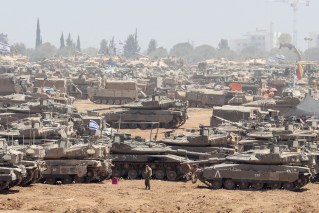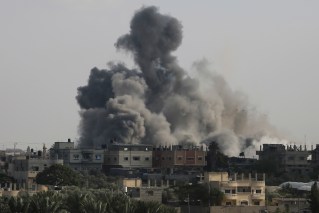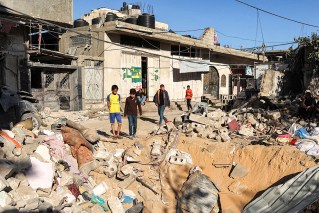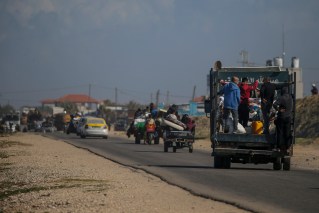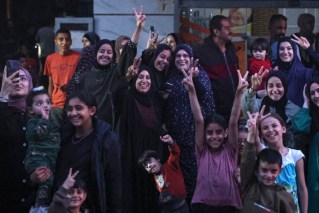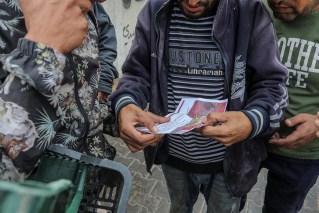Gazans fear Israeli hit on last refuge

People who fled fighting in the Gaza Strip gather along an overcrowded street in Rafah on February 1. Photo: Getty
Israeli forces have shelled the outskirts of the last refuge on the southern edge of the Gaza Strip, where the displaced, penned against the border fence in their hundreds of thousands, say they fear a new assault with nowhere left to flee.
More than half of Gaza’s 2.3 million residents are now homeless and crammed into Rafah.
Tens of thousands more have arrived in recent days, carrying belongings in their arms and pulling children on carts, since Israeli forces launched one of the biggest assaults of the war last week to capture Khan Younis, the main southern city, just to the north of Rafah.
If the Israeli tanks keep coming, “we will be left with two choices: Stay and die or climb the walls into Egypt”, said Emad, 55, a businessman and father of six, reached on a mobile phone chat app.
“Most of Gaza’s population are in Rafah. If the tanks storm in, it will be a massacre like never before during this war.”
Israeli Defence Minister Yoav Gallant said late on Thursday that troops would now turn to Rafah, which along with Deir al-Balah just north of Khan Younis is among the last remaining areas they have yet to storm in an almost four-month assault.
As the only part of Gaza with access to the limited food and medical aid trickling across the border, Rafah and adjacent parts of Khan Younis have become a teeming warren of makeshift tents clinging to the winter mud.
Wind and cold weather added to the misery, blowing tents down, flooding them and the ground between them.
The Gaza war was triggered by Hamas fighters who stormed across the border fence into Israel on October 7, killing 1200 people and capturing 253 hostages, according to Israeli tallies.
Since then, Gaza health authorities say more than 27,000 Palestinians have been confirmed killed, with thousands more feared dead among the ruins, in an Israeli assault that has laid much of the territory to waste.
Mediators are waiting for a response from Hamas, the militant group that runs Gaza, to a proposal drafted last week with Israeli and US spy chiefs and passed on by Egypt and Qatar, for the first extended ceasefire of the war.
There was brief celebratory gunfire in Gaza on Thursday when Arabic-language media reported comments by a Qatari official suggesting the ceasefire was close.
But Qatar made clear a deal had not yet been reached.
The only truce so far lasted for only a week in late November, when militants freed 110 women, children and foreign hostages.
The proposal now on the table would be for a far longer cessation of hostilities, letting aid reach the enclave and Gazans return to abandoned homes.
One Palestinian official said it envisages a first phase lasting 40 days, during which Hamas would free remaining civilian hostages, followed by further phases to release soldiers and hand over the bodies of the dead.
But the sides remain far apart over what would follow.
Israel says Hamas must be eradicated before it pulls its troops out of Gaza or releases detainees.
Hamas says it will not disband, and will not sign any truce deal or give up hostages without an agreement for Israel to pull out and end the war.
The Middle East is also on edge about the prospect of US strikes on pro-Iranian militia in Syria and Iraq, potentially leading to further escalation, following the deaths of three US soldiers last Saturday in a drone strike in Jordan.
Washington has said it is preparing to retaliate for the attack, the first time its soldiers were killed in a wave of escalatory violence across the region by pro-Iranian groups since the Gaza war began.
US President Joe Biden, under pressure to take firm action without starting a wider war with Iran, has said he has already decided on a response, which US officials say will involve strikes over multiple days.
Tehran says it will respond.
“We will not start any war, but if anyone wants to bully us they will receive a strong response,” President Ebrahim Raisi said in a televised speech.
–AAP



